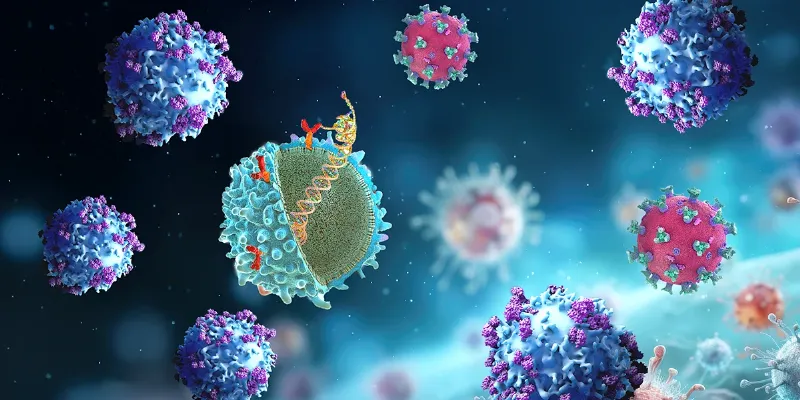mRNA Vaccines Plus Checkpoint Inhibitors Shows Curative Potential in Gastric Cancer

15 August 2025
A novel mRNA-based vaccine encoding tumor-specific neoantigens significantly enhanced anti-PD-1 therapy in gastric cancer with peritoneal metastasis. In preclinical models, the vaccine alone prevented metastasis and, when combined with anti-PD-1, eradicated established tumors by expanding both progenitor and effector T cells—offering a promising strategy for durable, personalized immunotherapy in hard-to-treat gastric cancers.
Researchers from Kindai University, Japan, have developed a neoantigen (neoAg)-based mRNA vaccine that shows promising results against one of the deadliest forms of gastric cancer: peritoneal metastasis. Published in Gastric Cancer, the study shows proof of concept for how personalized mRNA vaccines may reshape the landscape of cancer treatment.
Peritoneal Metastasis in Gastric Cancer
Peritoneal metastasis—the spread of gastric cancer cells to the peritoneal lining—is a common and particularly lethal form of disease recurrence following surgery. Traditional treatments, including the now-standard regimen of chemotherapy combined with PD-1 immune checkpoint inhibitors such as nivolumab, have shown little efficacy in this setting. As a result, survival outcomes for patients with peritoneal dissemination remain grim.
The new study addresses this unmet clinical need by leveraging two powerful concepts in immunotherapy: personalized cancer vaccines and mRNA technology.
Neoantigens and mRNA: The Twin Pillars of Personalization
The vaccine developed by the team encodes three tumor-specific neoantigens—mutated peptides unique to tumor cells—identified from the murine YTN16 gastric cancer model. Synthesized through in vitro transcription and delivered via lipid nanoparticles (LNPs), the mRNA strands are designed to instruct host cells to produce these neoAgs, triggering a targeted immune response.
These results are especially exciting in the context of the push towards next-generation, ‘personalized’ cancer treatment. “NeoAgs, derived from individual genetic alterations in each cancer patient, serve as unique immunological targets on tumor cells and represent the key to personalized immunotherapy,” said lead author Dr. Kazuhiro Kakimi, Professor of Immunology at Kindai University.
Unlike traditional vaccines, which rely on shared tumor-associated antigens that often lead to off-target effects, neoAg-based vaccines hold the potential for precision without collateral damage.
mRNA Vaccine Plus Anti-PD-1 Therapy
The real innovation lies in combining this personalized vaccine with immune checkpoint blockade. In mouse models, the mRNA-LNP vaccine significantly outperformed a dendritic cell-based vaccine carrying the same neoantigens. When combined with anti-PD-1 therapy, the duo achieved robust tumor regression and, in many cases, complete tumor eradication.
Mechanistically, the researchers observed a distinct shift in T-cell dynamics. The mRNA vaccine alone expanded a pool of progenitor exhausted (Tex^prog) CD8+ T cells—an early-stage, stem-like population capable of replenishing effector T cells. Anti-PD-1 therapy alone, by contrast, primarily increased intermediate exhausted (Tex^int) cells without sustainable renewal. Together, the combination promoted both Tex^prog and Tex^int subsets, generating a more durable and functional antitumor response.
Clinical Relevance: From Prevention to Treatment
In peritoneal dissemination models, the vaccine demonstrated both prophylactic and therapeutic benefits. Administered before tumor inoculation, it prevented metastasis. Administered after metastasis was established, especially alongside anti-PD-1 therapy, it significantly curtailed tumor progression. This dual utility is particularly important in clinical oncology, where both prevention of recurrence and control of existing disease are crucial endpoints.
Broader Implications and Roadblocks Ahead
The work adds to a growing body of literature supporting the use of neoAg-based mRNA vaccines in solid tumors. Moderna’s mRNA-4157 and BioNTech’s BNT122 are already in clinical trials for melanoma, lung, and pancreatic cancers, often in combination with checkpoint inhibitors.
Yet, significant hurdles remain. Chief among them is the accurate identification of immunogenic neoantigens—those that can be processed and presented in vivo and recognized by T cells.
“Although we observed that these vaccines had remarkable therapeutic efficacy, the greatest challenge lies in identifying the true neoAgs that are recognized and attacked by T cells in vivo,” said Dr. Kakimi.
Future directions may involve integrating the mRNA-LNP platform with tumor microenvironment-modulating agents, such as JAK inhibitors, to further enhance efficacy in immunologically “cold” settings like peritoneal metastases.











Comments
No Comments Yet!